Changing History to HERstory: Powerful Politicians
For International Women's Day 2021, Kat Shaw decided to look back over history and change it to HERstory. Her exhibition aimed to honour 57 magnificent women who have shaped the way the world is today yet have often gone unnoticed.
To read the story of all the women who inspired Kat's exhibition - visual artists, writers, scientists & explorers, protesters, and stars of sport, screen and music - visit the exhibition's homepage and follow the links.
Here, we focus on women politicians who have made their mark.
“The difference between a broken community and a thriving one is the presence of women who are valued.”
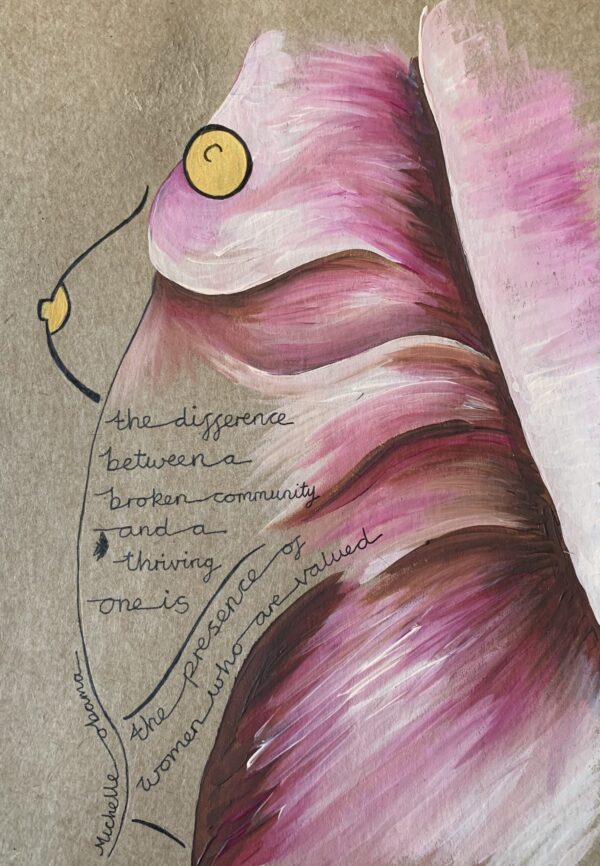
Michelle Obama
Michelle LaVaughn Robinson Obama (born 17th January 1964) is an American attorney and author who was the first lady of the United States from 2009 to 2017. She is married to the 44th president of the United States, Barack Obama, and is the first African-American first lady.
Michelle has been creating her own legacy in many ways, including the 'Let Girls Learn' initiative started in March 2015. Its aim is to help educate the 62 million girls around the world who aren’t in school.
“I see myself in these girls, I see my daughters in these girls, and I simply cannot walk away from them. I plan to keep raising my voice on their behalf for the rest of my life. I plan to keep urging world leaders to invest in their potential and create societies that truly value them as human beings. I plan to keep reaching out to local leaders, families, and girls themselves to raise awareness about the power of sending girls to school.”
Her speeches are always full of inspiration. One of her most famous speeches included the following inspirational words:
“The women we honour today teach us three very important lessons.
One, that as women, we must stand up for ourselves.
The second, as women, we must stand up for each other.
And finally, as women, we must stand up for justice for all.”

“Am I good enough? Yes, I am.”
She also spoke directly to men at the United State of Women Summit. “Be better at everything. Be better fathers. Good lord, just being good fathers who love your daughters and are providing a solid example of what it means to be a good man in the world, showing them what it feels like to be loved. That is the greatest gift that the men in my life gave to me.”
Addressing a group of young African leaders in 2014, she made it really clear that respect for women is critical when it comes to making a nation successful, saying: “No country can ever truly flourish if it stifles the potential of its women and deprives itself of the contributions of half of its citizens.”
She uses her status to powerfully and emotively speak out about the oppressed circumstances in which many African women find themselves. She said: “Any man who uses his strength to oppress women is a coward, and he is holding back the progress of his family and his country.”

“There is no limit to what we, as women, can accomplish.”
“I’ll be fierce for all of us”
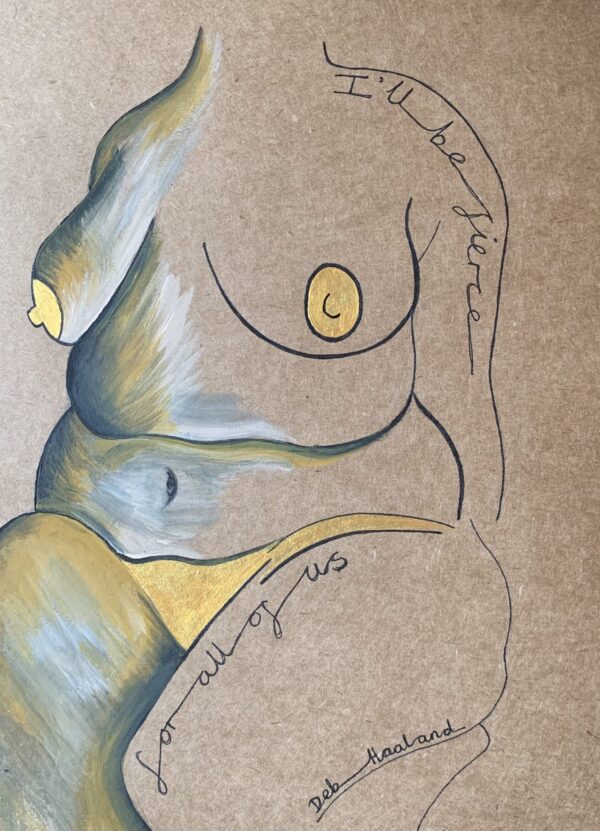
Deb Haaland
Debra Anne Haaland (born 2nd December 1960) is an American politician who has been the U.S. Representative from New Mexico's 1st congressional district since 2019. She is the first native American Cabinet Secretary, as an enrolled member of the Laguna Pueblo, one of 574 sovereign tribal nations located across 35 states. The Pueblo people have lived on the land that is now New Mexico since the 1200s and Haaland identifies as a 35th-generation New Mexican.
Debra Haaland is making American HERstory, and in her position, has responsibility for the country’s land and natural resources as head of the Department of the Interior as well as upholding the government’s legally binding obligations to the tribes. In an interview days before her nomination, Haaland said that as Secretary of the Interior, she would “move climate change priorities, tribal consultation and a green economic recovery forward.” In her acceptance speech, she said: “I’ll be fierce for all of us, for our planet, and all of our protected land”.
But this is not the first time Haaland has made HERstory. In 2018, she became one of the first two Native women in Congress, alongside Sharice Davids of Kansas. Representation and diversity matter, according to Haaland, because life experiences shape political decisions.
“We don’t need people who all have the same perspective, we need people from various parts of the country, who’ve been raised in different ways, who bring that history and culture with them, and employ what we’ve learnt from their parents and grandparents, and bring all of that to bear in the decisions that we make.”
It’s been a rocky road for Haaland, who has experienced homelessness and relied on food stamps. She is also the product of racist policies. “There are a lot of people in this country who suffered historical trauma. I carry history with me, I’m a product of the assimilation policy of the United States. I feel very strongly that having this perspective is super important for the issues we bring to Congress.”
Haaland was elected to the House of Representatives in 2018 after campaigning under the slogan: “Congress has never heard a voice like mine.” Since then, she has introduced legislation that would establish a truth commission on Native American boarding schools and spearheaded two laws to combat the epidemic of missing and murdered Indigenous women. Haaland will be the most senior Native American in the US government since the Republican Charles Curtis, a member of the Kaw nation situated in what is now Kansas, who served as vice-president to Herbert Hoover between 1929 and 1933.
“The emotional, sexual and psychological stereotyping of females begins when the doctor says: ‘It’s a girl'.”
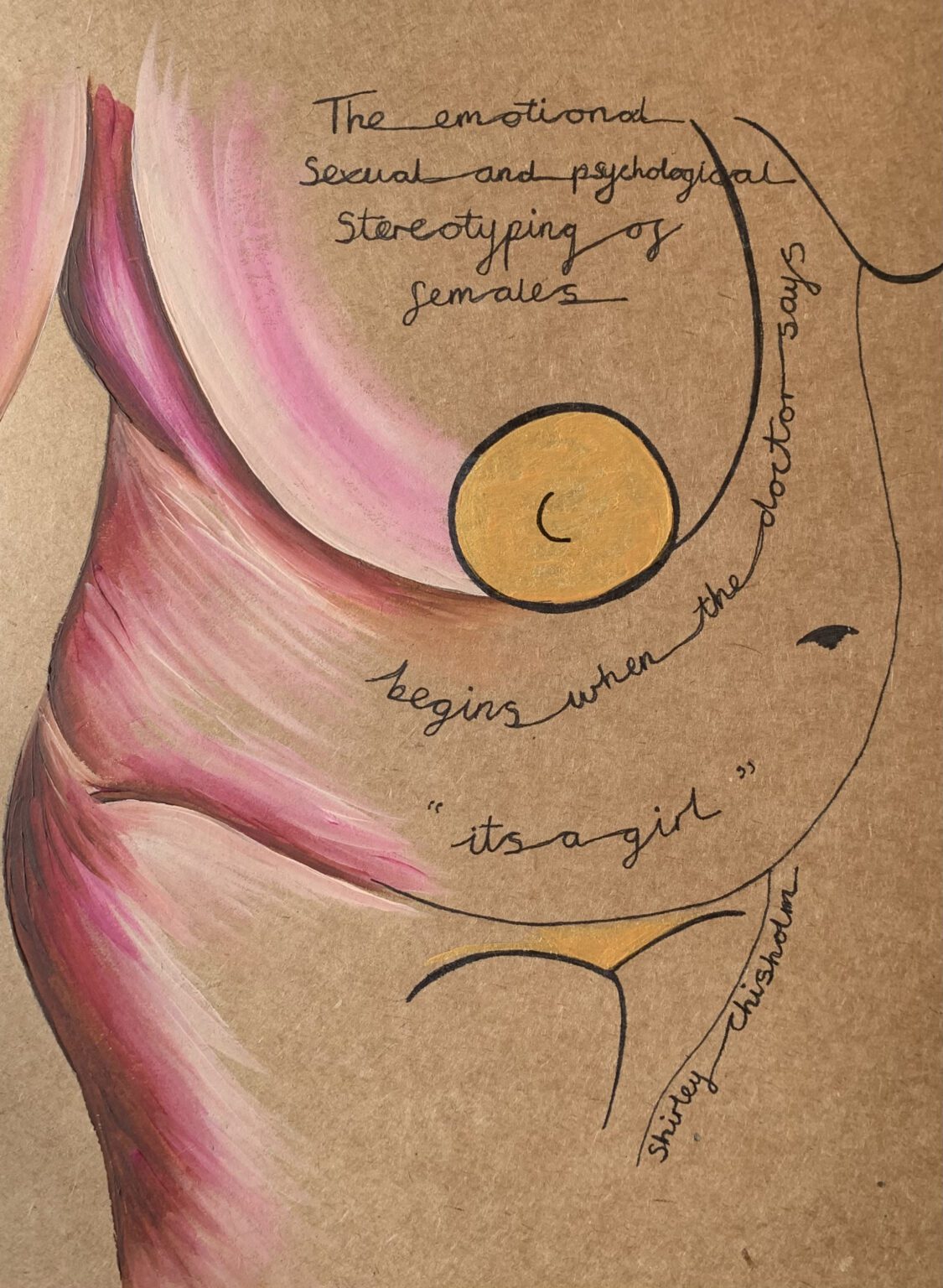
Shirley Chisholm
Shirley Anita Chisholm (1924 – 2005) was an American politician, educator, and author. In 1968, she made HERstory by becoming the first Black woman elected to the United States Congress, representing New York's 12th congressional district for seven terms from 1969 to 1983.
The Brooklyn-born activist and political leader later entered the 1975 Democratic presidential race – becoming the first woman and the first black American to do so. In Congress, she quickly became known as a strong liberal who opposed weapons development and the war in Vietnam.
Chisholm, a founder of the National Women’s Political Caucus, supported the Equal Rights Amendment and the legalisation of abortions throughout her congressional career. She later wrote the autobiographical works Unbought and Unbossed (1970) and The Good Fight (1973).
“We must reject not only the stereotypes that
others hold of us, but also the stereotypes that
we hold of ourselves.”
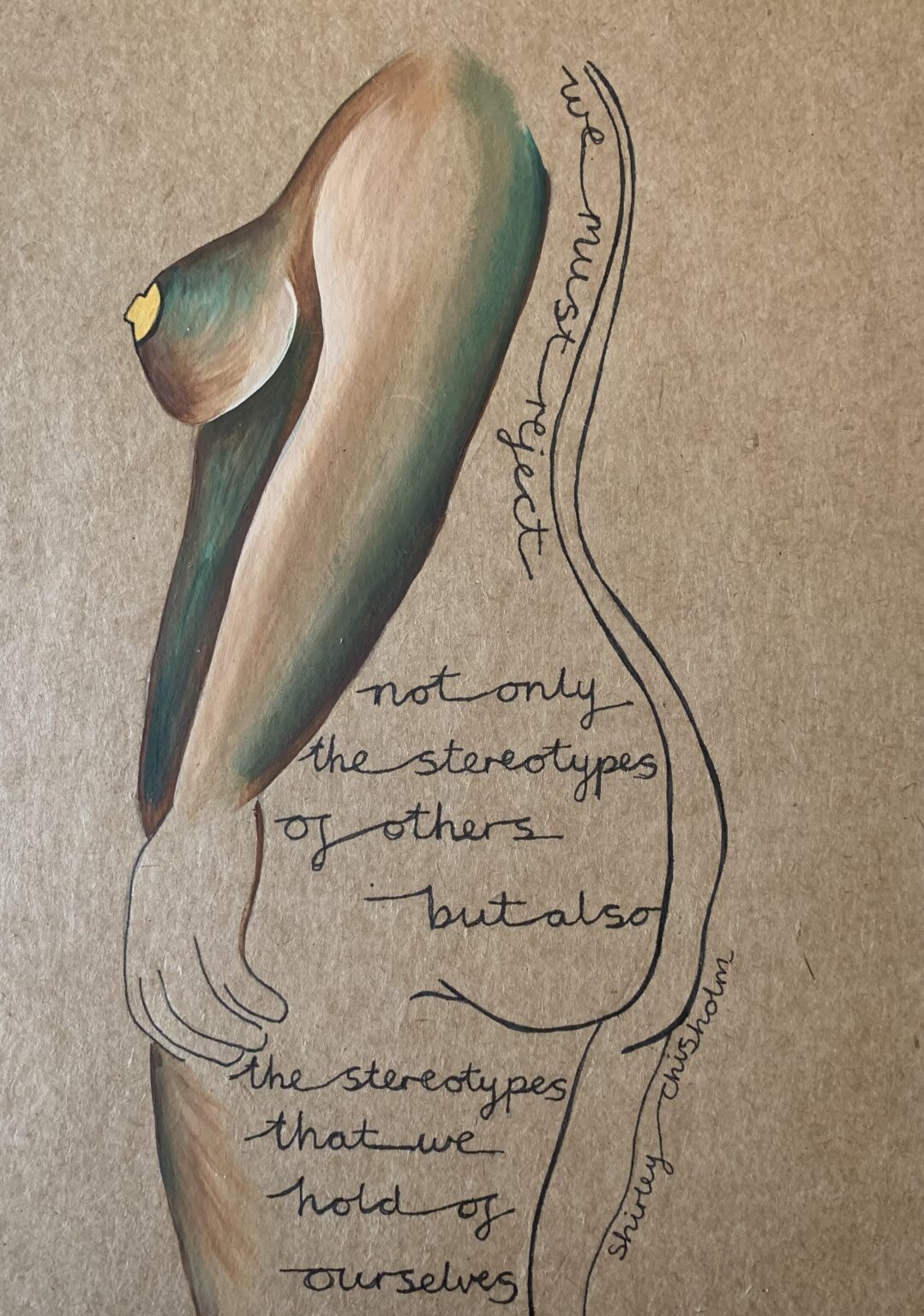
Kamala Harris
“What I want young women and girls to know is that you are powerful and your voice matters.”
Kamala Devi Harris (born on 20th October 1964) is an American politician and attorney who is the 49th and current Vice President of the United States. She is the United States' first female vice president, the highest-ranking female elected official in U.S. history, and the first African American and first Asian American vice president - HERstory in the making!
Harris was born in Oakland, California, in 1964. Her mother Shyamala, an Indian immigrant, was a breast cancer researcher; she died in 2009. Donald, her father, is a Jamaican American economics professor. Both parents took her along to civil rights marches in her pushchair. With this family background, she was always aware of the legacy left by other activists, building the steps on which she climbed - something she alluded to in her acceptance speech at the DNC: "That I am here tonight is a testament to the dedication of generations before me – women such as Constance Baker Motley, Fannie Lou Hamer and Shirley Chisholm. Women who believed so fiercely in the promise of equality, liberty and justice for all.”
Harris’ achievement of reaching the second highest office in the country shatters the glass ceiling for so many of her countrywomen and citizens from ethnic minorities. She gives them hope for a future where the top tiers of US government will no longer be populated almost exclusively by white men. During her first speech as vice president-elect, she promised those listening, "While I may be the first woman in this office, I will not be the last.”
Beyond race and gender, Kamala Harris continues to inspire many people in the US and around the world.
“You are powerful and your voice matters.”
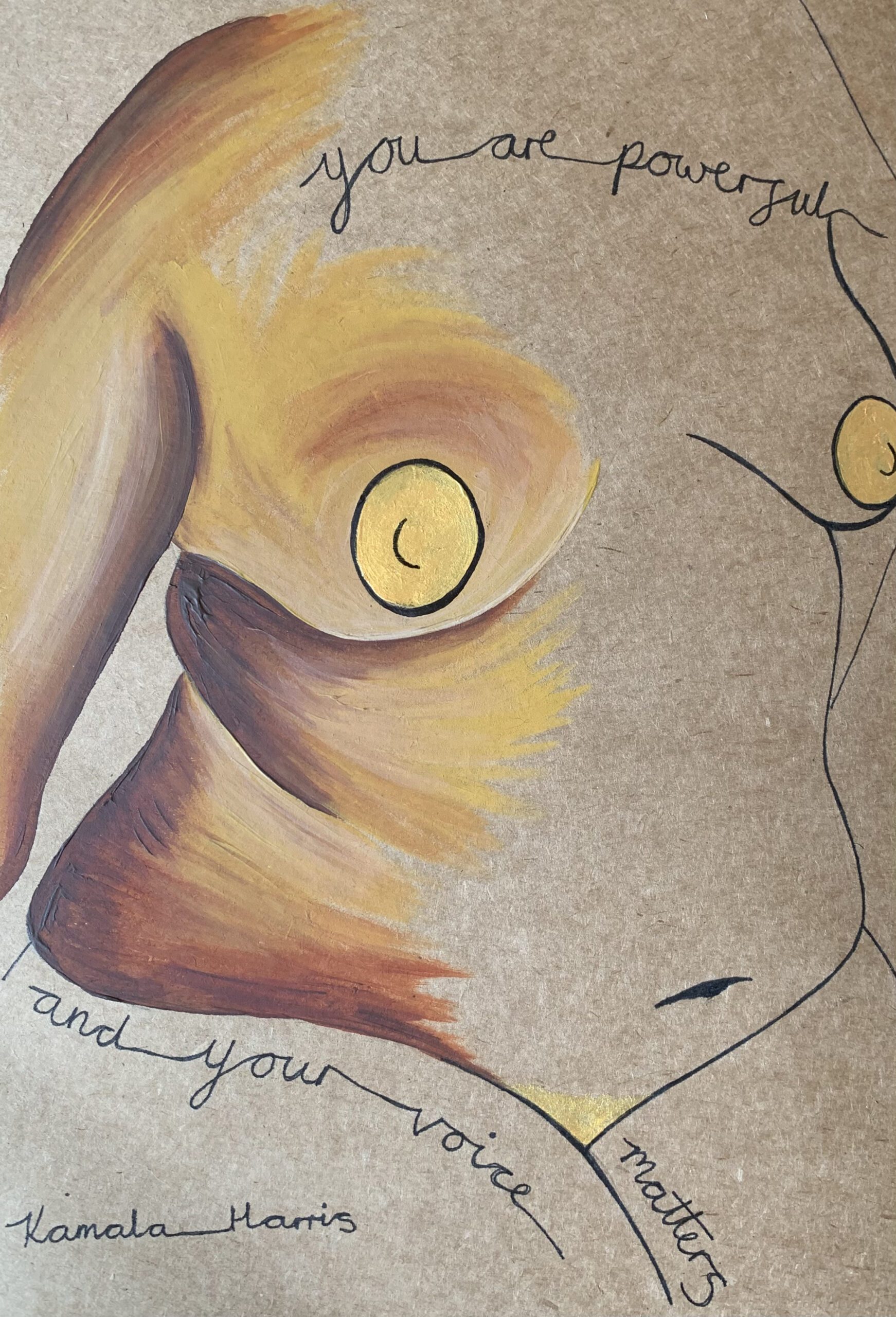
"This is a country of possibilities, and to the children of our country, regardless of your gender, our country has sent you a clear message: Dream with ambition, lead with conviction and see yourselves in a way that others may not, simply because they've never seen it before. But know that we will applaud you every step of the way".
She continues to write HERstory by ignoring those who don't believe she has the right or ability to achieve change. "I didn't listen. And the people didn't listen, either. And we won."
Eleanor Roosevelt
“You gain strength, courage and confidence by every experience in which you really stop to look fear in the face. You are able to say to yourself “I lied through this horror. I can take the next thing that comes along.” You must do the thing you think you cannot do.”
A shy, insecure child, Eleanor Roosevelt (1884 – 1962) would grow up to become one of the most important and beloved First Ladies, authors, reformers, and female leaders of the 20th century.
Born on October 11, 1884 in New York City, Anna Eleanor Roosevelt was the first of Elliot and Anna Hall Roosevelt’s three children. Her family was affluent and politically prominent, and while her childhood was in many ways blessed, it was also marked by hardship: her father’s alcoholism, as well as the deaths of both parents and one of her brothers before she was ten years old. She was raised by her harsh and critical maternal grandmother, who damaged Eleanor’s self-esteem. Timid and awkward, she believed that she compared badly with other girls.
In 1899, Roosevelt began her three years of study at London’s Allenswood Academy, where she became more independent and confident. She returned to New York for her social debut in 1902, where she became involved with the settlement house movement, teaching immigrant children and families.
In 1905, after a long courtship, she married her distant cousin Franklin Delano Roosevelt, a charming, Harvard graduate in his first year of law school at Columbia University. Her uncle and close relative, President Theodore Roosevelt, walked her down the aisle.
“You must do the thing you think you cannot do.”
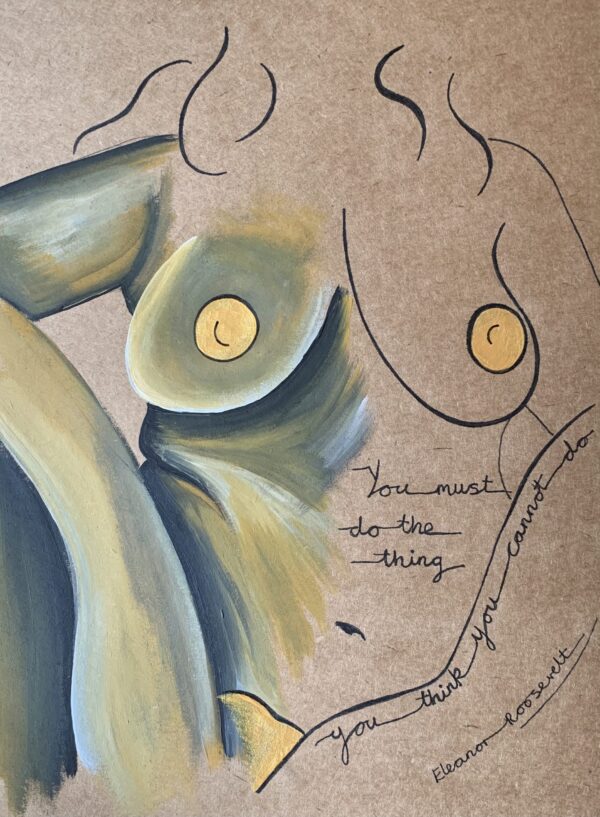
The Roosevelts settled in New York, where Eleanor found herself under the thumb of her controlling mother-in-law, Sara Roosevelt, who, like her grandmother earlier, was harsh in her criticism of her daughter-in-law. While Franklin advanced his career, his wife raised their daughter and four sons under the watchful eye of her belittling mother-in-law.
All that changed in 1911, when Franklin was elected to the New York State Senate, and the couple moved to Albany, away from Sara. Two years later, the Roosevelts moved to Washington, DC, and when World War I broke out, she volunteered with various relief agencies. Roosevelt promoted women’s political engagement, playing a leadership role in several organizations, including the League of Women Voters and the Women’s Trade Union League and soon became the most politically active and influential First Lady in history.
In the White House from 1933 to 1945, First Lady Roosevelt kept a dizzying schedule. She wrote nearly 3,000 articles in newspapers and magazines, including a monthly column in Women’s Home Companion, donating what she earned from the column to charity.
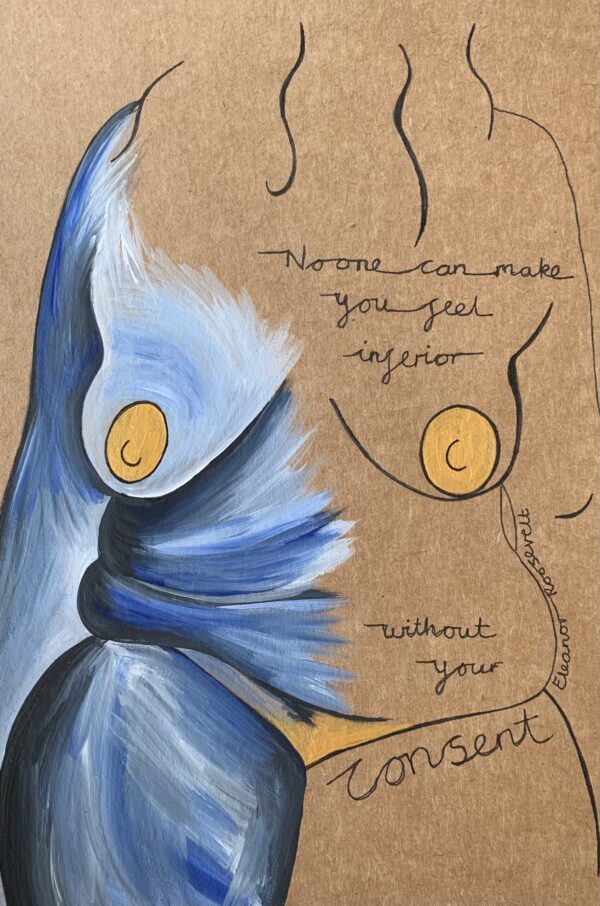
"No one can make you feel inferior without your consent."
She also authored six books and travelled nationwide delivering countless speeches. She held weekly press conferences with women reporters who she hoped would get her message to the American people.
Roosevelt had immense influence on her husband’s decisions as president and in shaping America, and her political activism did not end with her husband’s death in 1945.
In 1946, she was appointed as a delegate to the United Nations, the institution established by her husband. She remained in this role for a decade, a dedicated advocate for world peace. She not only chaired the United Nations Human Rights Commission, she also helped write the 1948 United Nations Declaration of Human Rights, as well as chairing the President’s Commission on the Status of Women, which released a ground-breaking study about gender discrimination a year after her death in 1963. Roosevelt worked on the Equal Pay Act, too, that was passed that same year.
Roosevelt’s commitment to racial justice was evident in her civil rights work and efforts to push Washington to take swifter action in housing desegregation and protections for Freedom Riders and other activists. Kennedy nominated Roosevelt for the Nobel Peace Prize and though she did not win, she remained at the top of national polls ranking the most respected women in America decades after her death. She dramatically changed the role of the first lady, advocating for human rights, women’s rights and children’s causes, and has definitely made history HERstory.
“My mother told me to be a lady. And for her, that meant be your own person, be independent.”
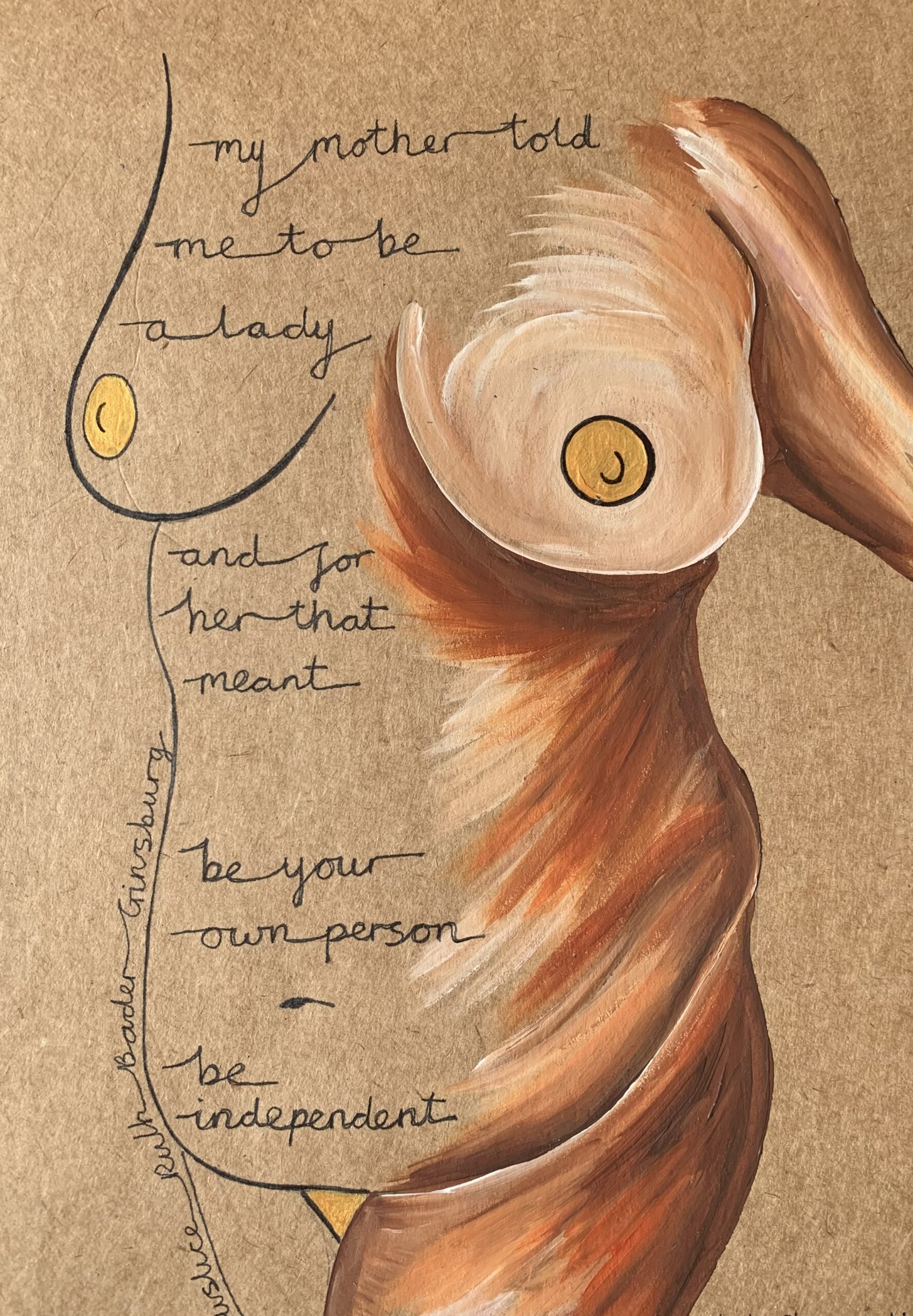
Ruth Bader Ginsberg
Small in stature but huge in impact, Justice Joan Ruth Bader Ginsburg became the second woman to enter the US Supreme Court in 1993 and is famous for giving a voice to the underrepresented. She went by Ruth rather than Joan and, in later years, was often affectionately referred to as simply RBG.
Ginsburg was a bright student who gained a full scholarship to Cornell University. There she met fellow student Martin Ginsburg, whom she married in 1954 just after graduation; he was her greatest supporter and theirs was, remarkably at the time, a marriage of equals. She also met the author Vladimir Nabokov, who shaped her writing career, and the constitutional lawyer Robert Cushman, who inspired her to go into law - leading, after two relocations and the birth of her daughter, to Ginsburg starting studies at Harvard Law School. There, she was just one of nine female students among 500 men. She and her fellow female students were often overlooked, refused access to the library, and made to explain, on entry, why they were taking a university place away from a man.
Alongside these difficulties, she had the added pressures of motherhood and caring for her husband, a year above her at Harvard, who was diagnosed with testicular cancer. Despite this, Ginsburg became the first woman to join the Harvard Law Review editorial staff and graduated valedictorian when she transferred to Columbia. Even after these successes, she struggled to find work and acceptance as a female lawyer, and having found employment, she tried to hide her second pregnancy for fear of losing her contract.
This determination in the face of adversity and resistance was the hallmark of her life and career, and she went on to become a successful lawyer and legal writer.
From the start, she battled to change the world for the better striving to represent minorities. She partnered with the American Civil Liberties Union in 1971, making the justice system look afresh at two laws that favoured either sex. One made men the preferential choice to administer estates (supposedly due to their superior financial acumen) and a Social Security law that prevented men from receiving benefits from a deceased wife. In 1972, she became founding counsel of the ACLU’s Women’s Rights Project and coauthored a law school casebook on gender discrimination.
President Jimmy Carter appointed Ginsburg to the U.S. Court of Appeals for the District of Columbia Circuit in Washington, D.C. in 1980, and in 1993, President Bill Clinton nominated her to the Supreme Court. Her rulings helped further the rights of women to reproductive healthcare, pregnancy benefits and equal pay, and she was instrumental in the legalisation of gay marriage in all 50 states in 2015
Famously, she once remarked that she hoped there would be a time when all nine Supreme Court Justices were women. “People are shocked [when I say that],” she said,” but there have been nine men and nobody’s ever raised a question about that.”
















